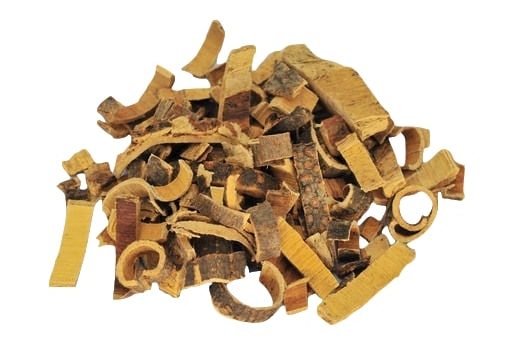Albizia Bark

What is Albizia Bark?
Albizia Bark (he huan pi, 合欢皮), also known as Persian Silk Tree Bark or Mimosa Bark, is the bark of the plant Albizia Julibrissin. The plant is commonly produced in Western Asia and Southern China, especially in the provinces along the Yangtze River. It is recognised for its characteristic feathery flowers that come in a mixture of white, pink and purple shades. The bark of the plant is then collected during Summer and Autumn, cut into strips, and dried for medicinal usage.
It is common to find Albizia Bark in ancient Medicine treatments, such as Ayurvedic treatments, Mayan treatments and Traditional Chinese Medicine (TCM). The widespread publication of new research on Albizia Bark today has also given rise to renewed interest in the herb in other parts of the world. Time-tested ancient wisdom has long praised this herb as an important therapeutic tool.
In TCM, Albizia Bark falls under the category of ‘Herbs that nourish the Heart and calm the Spirit’. Neutral in nature, the herb does not affect the yin-yang balance in the body. Also, sweet in taste, Albizia Bark can slow down acute reactions, detoxify the body, and it has a tonic effect on the body by replenishing qi and blood. In particular, the herb targets the Heart and the Liver.
Functions and Benefits of Albizia Bark
Traditional Chinese Medicine (TCM) shows that Albizia Bark has the following health benefits.
Sedative and calming, Albizia Bark can calm the spirit, induce tranquilization and relieve constrained emotions. By addressing Liver Qi Stagnation, the herb can tackle negative emotions such as restlessness, social anxiety, depression, insomnia, amnesia, dream-disturbed sleep, irritability, bad temper, oxidative stress, poor memory, and even to help one cope with Post-Traumatic Stress Disorder (PTSD).
Albizia Bark can invigorate blood to resolve Stasis, relieve swelling and alleviate pain. The herb can also address traumatic injuries such as fracture with swelling and pain by reconnecting sinews and bones. In addition, Albizia Bark can regulate qi to reduce abscesses, both internally and externally. For example, the herb can help to treat abscess of the Lungs with symptoms such as chest pain, as well as coughing and vomiting of pus and blood.
Other than being used to support a healthy stress response and a healthy mood, modern research has also discovered that Albizia Bark may provide relief from respiratory diseases. For individuals who suffer from asthma, allergies or chronic respiratory conditions, the herb may help to eliminate inflammation in their sinuses and tracts, which help to reduce the impulse to cough or wheeze. This can help to accelerate recovery and improve respiratory health.
With a vast array of antioxidant compounds in it, Albizia Bark may help to eliminate free radicals and counter radical damage in the body. These antioxidants also help to improve skin health by fighting signs of aging and addressing cutaneous conditions such as rashes, blemishes, wounds, acne or psoriasis. Other than that, its antioxidants can also eliminate the pain associated with the gout, arthritis and other inflammatory conditions.
In powdered form, Albizia Bark is often prescribed for gastrointestinal issues by aiding digestion. Similar to dietary fibre, the powder can bind to food and water, which can help to speed up digestion and promote regular bowel movements. Its ability of the herb to lower cholesterol levels may also help to improve heart health, prevent strokes and heart attacks.

How to Use Albizia Bark
The recommended daily dosage of Albizia Bark is 6 – 15g, often ground into powder or served as a decoction. Persian Silk Tree Bark Extract can also be used, but at much lower doses. Other than its internal usage via consumption, Albizia Bark can also be used externally as a poultice.
High-quality, sliced Albizia Bark is widely available at most Asian markets, specialty stores and herbal shops. Albizia Bark is also often available in forms such as powder, extracts, pills, tinctures and capsules.
Cautions and Side Effects of Albizia Bark
Albizia Bark should not be used by individuals who are experiencing colds or are pregnant. Individuals who are not experiencing Qi or Blood Stagnation should use this herb with caution too.
Also, the herb may cause drowsiness or impair one’s judgment, so many healthcare practitioners recommend patients to refrain from driving or operating heavy equipment within an hour of consuming Albizia Bark.
While Albizia Bark may be a great mood booster and an effective alternative to antidepressant pharmaceuticals, chronic depression is a lifelong and dangerous battle. Hence, we strongly encourage you to consult a psychological or healthcare professional if you are suffering from negative emotions such as thoughts of suicide and frequent anxiety. In addition, do consult your healthcare practitioner before deciding to add Albizia Bark to your diet for safety concerns.
Summary
Here is a summary for Albizia Bark:
- Herb name (Chinese): 合欢皮
- Herb name (Pin Yin): hé huān pí
- Herb name (English): Albizia Bark
- Herb name (Botanical): Cortex Albiziae
- Origin of species: Albizia julibrissin Durazz.
- Part(s) of herb used: Stem Bark
- Geo-specific habitat(s): Regions along the flow of Yangtze River
- Taste(s) & Properties: Sweet; Neutral; Administrates the Heart and Liver Meridians
- Actions: Eases symptoms of emotional irritations or distress; Relieves pain resulting from physical injuries and soothes bruises
References
Ghavidel, A., Bak, M., Hofmann, T., Hosseinpourpia, R., Vasilache, V., & Sandu, I. (2021). Comparison of chemical compositions in wood and bark of Persian silk tree (Albizia julibrissin Durazz.). Wood Material Science & Engineering, 1-12. [Accessed on 5th December 2022]
Kokila, K., Priyadharshini, S. D., & Sujatha, V. (2013). Phytopharmacological properties of Albizia species: a review. Int J Pharm Pharm Sci, 5(3), 70-73. [Accessed on 5th December 2022]
Zou, K., Zhang, Q. Y., Wang, B., Cui, J. R., Zhao, Y. Y., & Zhang, R. Y. (2010). Cytotoxic triterpenoid saponins acetylated with monoterpenoid acid from Albizia julibrissin. Helvetica Chimica Acta, 93(10), 2100-2106. [Accessed on 5th December 2022]
Share this article on
